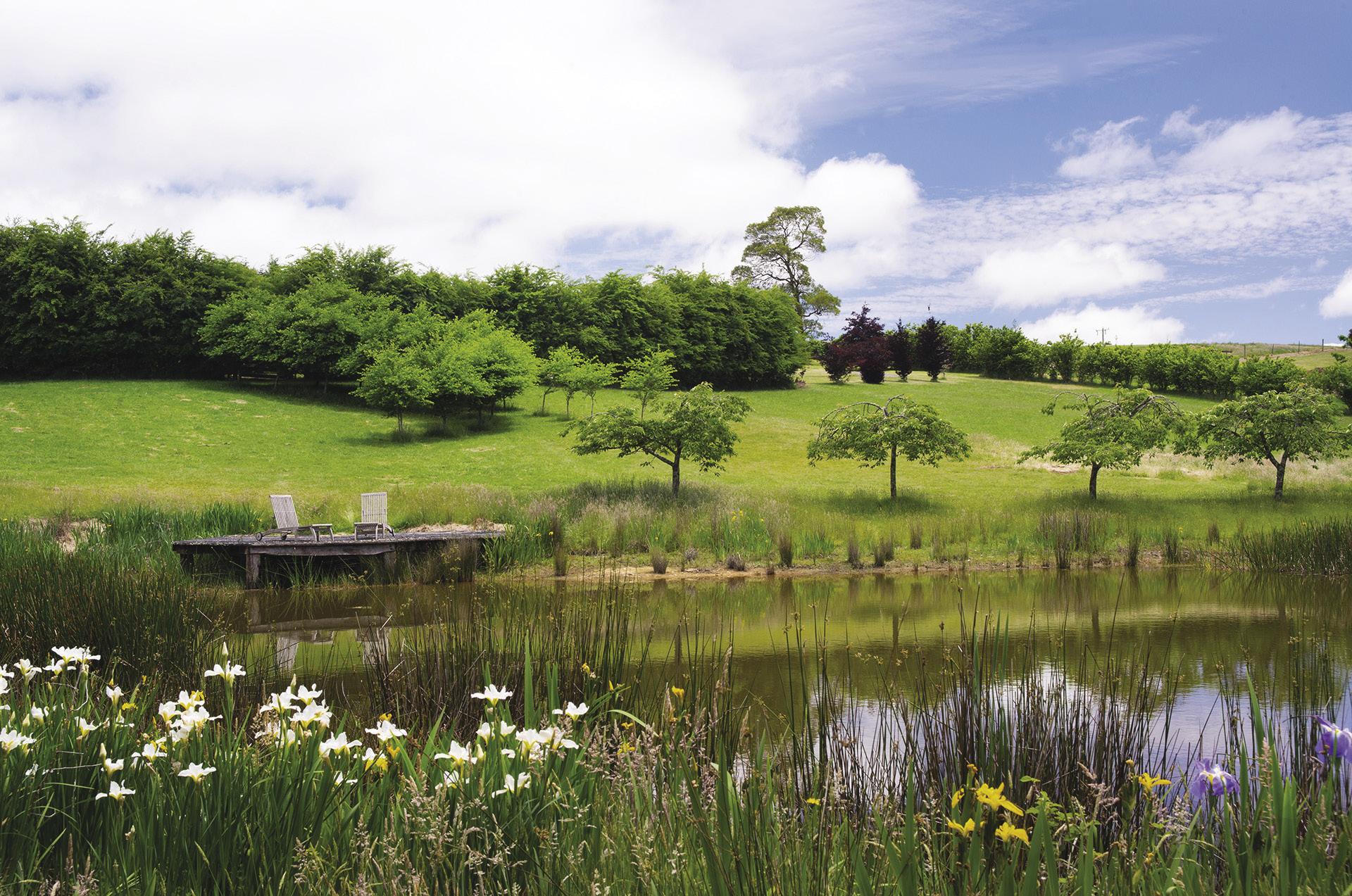
5 minute read
Land of Honey
Sofia Levin @sofiaklevin
Daniel Palm is obsessed with beekeeping. The microbiologist runs a research and development laboratory as a day job, but to call beekeeping his hobby is a major understatement.
Better known as Dan the Bee Man, Daniel has worked closely with the Wolf-Tasker family and Lake House, Daylesford, for about eight years.
Initially he taught the team beekeeping and supported their hives. When the family opened Dairy Flat Farm in 2020 – a 38-acre regenerative farm with a vegetable garden, vineyard, established olive grove, 350 heritage fruit trees and accommodation for up to 12 guests – he relocated the bees.
Now Daniel runs beekeeping workshops in line with his motto, “beekeeping is for everyone.” They are open to the public and run from basic 1.5-hour sessions through to full-day intensives, but it’s Daniel’s enthusiasm that’s most contagious.
“There’s a tap at the bottom of the extractor, and there’s this moment when you open that tap and see the honey pouring out – there’s something absolutely magical about that,” he says.
People increasingly sign up for the workshops, not just for the honey but also to learn about the roles bees play in biodiversity and sustaining the food chain. About 30 per cent of our food relies directly on pollination, with bees the most efficient pollinators. "Albert Einstein said that if we lost our bees, we'd be dead within four to five years. From an environmental perspective, they're essential," says Daniel. "Bees visit hundreds of thousands of flowers each day. A colony of bees flies roughly the equivalent of three times around the world to produce half a kilogram of honey and, in its lifetime, one bee will produce approximately onetwelfth of a teaspoon of honey."
Daniel’s favourite question to ask workshop participants is how fresh honey tastes. Like wine, it has a front, middle and back palate with different characteristics (think butterscotch, floral, nutty, etc.). Also, just like wine, honey made in the same place changes slightly in
taste from season to season.

"The characteristics of honey vary so much, and people taste different things," says Daniel. "You can have your beehives in a location and leave them there season after season, and the honey will taste slightly different each season depending on the sun, rain and what the bees are foraging on."
When asked what his favourite thing about beekeeping is, Daniel is starry-eyed.

“To me, every part of beekeeping is special. I often tell people that beekeeping is quite relaxing and they look at me in a crazy way. But there are up to 90,000 insects in one hive that can sting you, so you have to calm down, you have to do everything slowly, you have to relax,” he says. “I find after I’ve had a stressful week in the day job, I just go out to a hive, open it up and stop and listen to the buzz of the bees.”
Studies involving people diagnosed with depression, anxiety and post-traumatic stress disorder suggest that beekeeping can help alleviate symptoms. There’s also evidence to suggest that consuming honey from your local area can reduce allergic reactions to pollen, while in Eastern medicine, bee stings are used to ease arthritis. Beyond that, Daniel says it’s simply good for you.

“Honey is jam-packed with proteins, enzymes, amino acids, vitamins, minerals – absolutely everything beneficial for health. They say you can live off just honey and bananas,” he says.
About a 40-minute drive north of Dairy Flat Farm, Warral Maldon is a commercial honey supplier with small-business ethics. Run by fifth-generation beekeeper Lindsay Callaway, it produces more than 150 tonnes of honey and 2000 kilograms of beeswax each year, supplying big names such as Mondelez and McCain.

“If you’ve had a Honey Log, you’ve had our honey,” says Lindsay. “I remember delivering honey to what used to be Europe Health Food Company in Prahran and sliding the honey off the truck with Dad. I was probably ten years old, so we’ve been supplying those honey logs continuously…coming up 40 years.” Warral Maldon also offers pollination services. Lindsay points out that almond production is completely reliant on bees. At the same time, countless fruits and vegetables are either directly or indirectly dependent upon pollination, such as avocados and macadamias.
“We run our own farm of over 4000 hives and are doing about 2000 hives on canola seed pollination. Without bees, those crops wouldn’t exist,” says Lindsay. Years ago we flew under the radar…now people are aware that honey comes from hives, and hives are so crucial to the food chain.”

Although Lindsay has hives around Victoria, he’s especially fond of the Daylesford and Macedon Ranges area due to the high altitude and tree species encouraging bee reproduction.
“From Castlemaine 40 kilometres down the road, you can go up into the hills in Daylesford and you have a whole other stratosphere of goodies for the bees. It’s a huge resource for us beekeepers,” he says.
Warral Maldon is about to launch a signature range of 'straight line' honey species-specific, such as red gum and yellow gum. It will be available online and in their recently renovated gift shop, which is on the same property as the factory. Moving forward, Lindsay hopes to champion the provenance of honey, joining the dots between different varieties and the chefs, restaurants and cafés that use them.
“My dream would be to go into a café like Cliffy’s in Daylesford and have a long leaf box cheesecake or a Warral red gum-baked chicken,” he says. “I’m really proud of what we’re doing and hope that it shines through.”
Three more buzz-worthy experiences: Des O'Toole Honey, Daylesford The Good Life Farm Co., Kyneton Beelovable Honey Farm, Bullengarook
Photo opposite page: Warryl Maldon Brewery & Taproom Restaurant & Bar Accommodation Bottleshop
79 High St, Woodend
holgatebrewhouse.com










